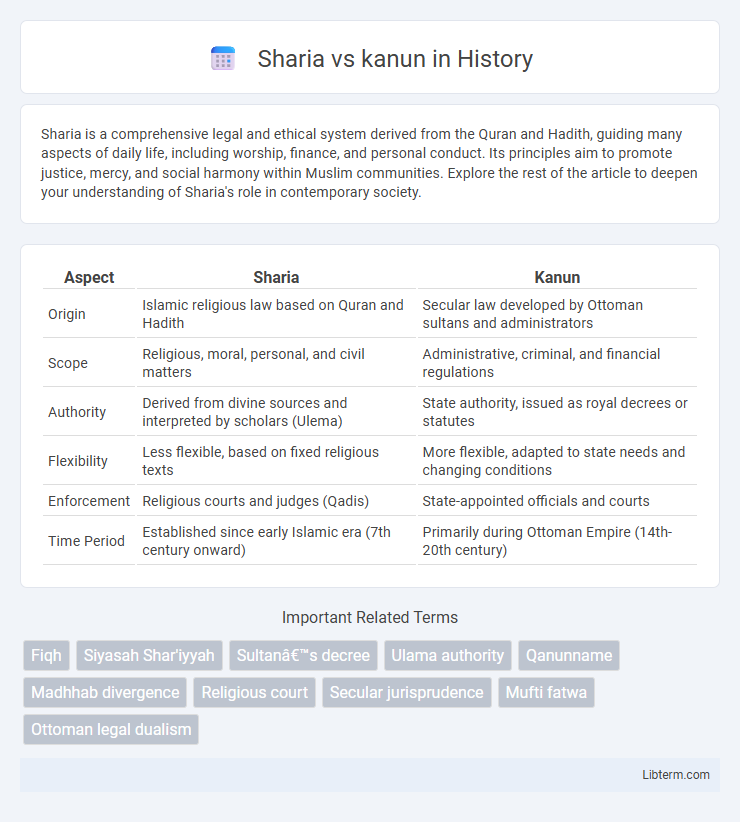Sharia is a comprehensive legal and ethical system derived from the Quran and Hadith, guiding many aspects of daily life, including worship, finance, and personal conduct. Its principles aim to promote justice, mercy, and social harmony within Muslim communities. Explore the rest of the article to deepen your understanding of Sharia's role in contemporary society.
Table of Comparison
| Aspect | Sharia | Kanun |
|---|---|---|
| Origin | Islamic religious law based on Quran and Hadith | Secular law developed by Ottoman sultans and administrators |
| Scope | Religious, moral, personal, and civil matters | Administrative, criminal, and financial regulations |
| Authority | Derived from divine sources and interpreted by scholars (Ulema) | State authority, issued as royal decrees or statutes |
| Flexibility | Less flexible, based on fixed religious texts | More flexible, adapted to state needs and changing conditions |
| Enforcement | Religious courts and judges (Qadis) | State-appointed officials and courts |
| Time Period | Established since early Islamic era (7th century onward) | Primarily during Ottoman Empire (14th-20th century) |
Understanding Sharia: Foundations and Principles
Sharia, derived from the Quran and Hadith, serves as the comprehensive Islamic legal framework governing religious, social, and moral conduct. Its principles emphasize justice, compassion, and the preservation of essential human rights, including life, intellect, and property. Unlike Kanun, a secular legal code informed by state authority, Sharia integrates divine guidance with legal rulings rooted in Islamic jurisprudence (fiqh).
The Origin and Development of Kanun
Kanun originated during the Ottoman Empire as a secular legal system complementing Islamic Sharia law, primarily addressing administrative and criminal matters. It evolved through Sultan Suleiman the Magnificent's promulgation of the Kanunname, codifying laws to manage state governance and public order effectively. Unlike Sharia's religious basis derived from the Quran and Hadith, Kanun was developed through sultanic decrees reflecting pragmatism and state interests.
Historical Context: Sharia and Kanun in Islamic Governance
Sharia, derived from the Quran and Hadith, served as the fundamental Islamic legal framework guiding personal, civil, and criminal matters in early Islamic governance. Kanun, developed later under Ottoman rule, complemented Sharia by addressing administrative and fiscal regulations not explicitly covered in religious law, reflecting pragmatic governance needs. This historical interplay allowed Islamic empires to balance divine directives with dynamic statecraft, shaping a dual legal system foundational to their administration.
Key Differences Between Sharia and Kanun
Sharia is Islamic law derived from the Quran and Hadith, focusing primarily on moral and religious principles governing personal and spiritual matters. Kanun refers to secular, state-created laws primarily concerned with administrative, criminal, and civil regulations independent of religious doctrine. Key differences include Sharia's basis in divine guidance and its emphasis on spiritual obligations, while Kanun represents codified legislative frameworks enacted by governmental authorities to address societal order and legal procedures.
The Role of Sharia in Religious and Personal Law
Sharia plays a central role in governing religious obligations, family matters, and personal status laws such as marriage, divorce, and inheritance for Muslims, directly influencing individual rights and societal norms within Islamic communities. Unlike kanun, which represents secular, codified laws enacted by the state, Sharia derives from the Quran, Hadith, and Islamic jurisprudence (fiqh), providing a divine legal framework rooted in religious principles. The coexistence of Sharia and kanun creates a dual legal system in many Muslim-majority countries, where Sharia primarily regulates personal and religious law while kanun addresses civil, criminal, and administrative matters.
Kanun as State Law: Secular and Administrative Functions
Kanun serves as the secular state law, encompassing administrative, fiscal, and criminal regulations distinct from religious Sharia principles. It provides a codified legal framework aimed at governing civic affairs and ensuring uniformity in state administration. Kanun's role excludes religious jurisprudence, focusing instead on pragmatic governance and legal consistency within a modern state system.
Interaction and Overlap: Sharia vs Kanun in Practice
Sharia and Kanun often interact and overlap in legal systems where Islamic law influences state legislation, with Sharia covering personal and religious matters while Kanun governs secular aspects such as criminal and administrative law. In practice, courts may apply Sharia principles in family and inheritance cases, whereas Kanun provides the framework for civil and penal codes, creating a complementary yet sometimes conflicting legal landscape. This interaction requires judicial interpretation to harmonize Sharia's moral guidelines with Kanun's statutory regulations, ensuring coherent legal outcomes within pluralistic societies.
Case Studies: Ottoman Empire’s Legal System
The Ottoman Empire's legal system intricately balanced Sharia, Islamic canonical law, with Kanun, the sultanic secular codes enacted by the state. Sharia governed personal status laws, including marriage and inheritance, while Kanun addressed administrative, criminal, and fiscal matters, facilitating state governance amid diverse populations. Case studies reveal this duality enabled legal flexibility and centralized control, exemplifying a sophisticated legal pluralism foundational to Ottoman administrative efficiency.
Modern Implications: Sharia and Kanun in Contemporary States
Modern implications of Sharia and Kanun reveal distinct approaches to governance and legal systems in contemporary states, where Sharia often influences personal status laws in Muslim-majority countries, focusing on religious principles. Kanun, derived from Ottoman legal traditions, serves as a secular legal framework emphasizing codified civil, criminal, and administrative laws, particularly in nations like Turkey and the Balkans. The coexistence and tension between Sharia and Kanun impact legal pluralism, human rights, and state sovereignty debates in diverse socio-political contexts.
Challenges and Debates: Harmonizing Dual Legal Systems
The coexistence of Sharia and Kanun presents significant challenges, including conflicts in legal principles and inconsistencies in application across jurisdictions. Debates intensify over reconciling religiously derived Sharia laws with secular Kanun statutes, especially concerning human rights, gender equality, and criminal justice. Efforts to harmonize these dual systems seek to establish coherent frameworks that respect cultural values while ensuring the rule of law and legal predictability.
Sharia Infographic

 libterm.com
libterm.com